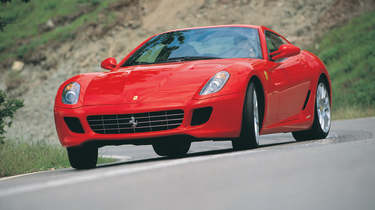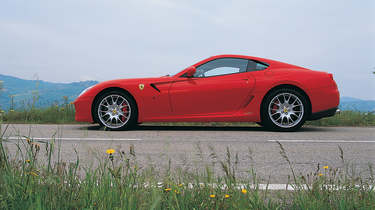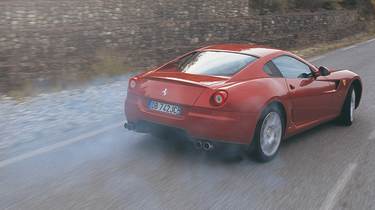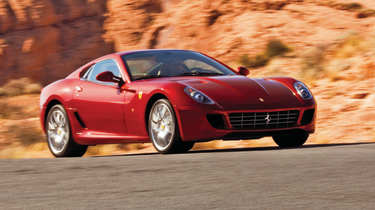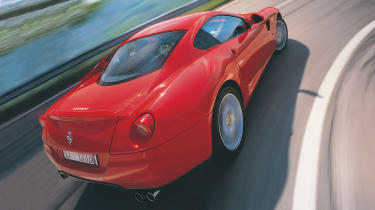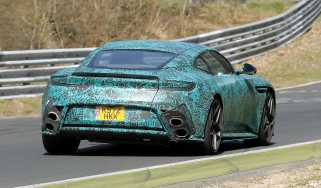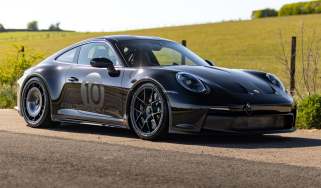Used Ferrari 599 GTB (2006 - 2012): review, specs and buying guide for the V12 GT
The Ferrari 599 GTB is a front-engined V12 superstar that’s outstanding value, and an eCoty-winner to boot
The successor to the 575M Maranello, the 599 GTB Fiorano arrived in 2006 boasting truly next-generation performance. Named after the 5999cc displacement of its naturally aspirated V12 – a derivative of the engine at the heart of the Enzo – the 599 is no slouch even 18 years later. A peak output of 611bhp is enough for a still-respectable 3.7sec 0-62mph claim (we recorded 3.5sec, in fact), but it was the measured way it delivered this performance that helped the 599 become our 2006 eCoty winner.
‘The Ferrari just seems a decade ahead of everything else here because it does everything brilliantly, almost at the flick of a switch,’ we said. ‘If the roads are a bit slippery, you can drive it and feel completely happy because you know you can leave it on the Sport setting. Then, when you get to a road you know and feel more confident, it just gets more and more focused. And it’s not too extreme. Get in the [997.1] GT3 and you’re in a racing car straight away. In the Ferrari you’re in a GT, it’s got some luxury, a bit more style.’
What to look out for
Cost of purchase is one thing, but maintenance of any Ferrari is a scary prospect at the best of times, never mind one with 12 cylinders. There’s no hiding the fact that the 599’s relative rarity, sky-high new price and high cylinder count will result in more expensive overall running costs than most other performance cars, but enter ownership with your eyes open and it may not be as bank-balance draining as you think.
Being a relatively modern model, the 599 doesn’t suffer from the same electrical horror stories as some of its predecessors, with its F140 V12 so widely used that parts prices can be fairly reasonable should you look hard enough. Regular oil changes for both the engine and the automated manual gearbox are especially vital for healthy running, so look for this in the service history. A pair of ceramic brake discs will set you back almost £7000, a clutch well over £2000 (before labour) and a pair of dampers more than £3000, so pay attention to these when buying. To avoid additional unwanted bills, also check carefully for cracked rear lights, suspension knocks and awkward gearshifts.
What to pay
The classifieds may not be overcrowded with 599s for sale, but there are some excellent deals to be had nonetheless. Prices currently start from as little as £70,000 – that’s £100,000 less than a new one would have set you back in 2006 (or a massive £215,000 saving accounting for inflation). For that money you’ll get a car with somewhere in the region of 30,000 miles, but spend another £10,000 and circa-10,000-mile examples come within reach.
More reviews
Cars with the HGTE package – which uprated the suspension, made the gearshifts even faster and introduced a louder exhaust – begin at around £100,000, with the very best on the market priced at £110,000. While a manual transmission was an option, only 30 buyers opted for it, making these cars ludicrously expensive when they do become available. If you’re really looking to burn some cash, £650,000 is enough for a 599 GTO, which was faster around Ferrari’s Fiorano test track than an Enzo…
What we said
'On the road, the 599 is infused with a satisfying tautness. It starts with the seat, which is deeply sculpted, firmly padded and perfectly aligned with the pedals and fat-rimmed steering wheel. The transmission controls the clutch more positively in manoeuvring than other F1 types, but just as smoothly; the throttle and brake have good weight and feel; the low-speed ride is firm but not crashy.
Right from the off, the V12 sounds glorious, and the ebb and flow of its complex, thunder-laden note when you press the throttle deeply in a high gear is epic. There’s a distinct pick-up in the delivery at 3000rpm and another at 5500, by which time you’re fast approaching three-figure speeds in fourth. The 599 merely feels like it’s getting into its stride, the ride having settled, wind and road noise subdued. Floor the throttle and it snaps forward instantly with a force that stuns passengers.
> Mercedes-Benz SLS AMG (2010 - 2015): Germany's answer to the Ferrari 599
The work of the magnetorheological dampers goes largely unnoticed, which is as it should be. By applying a magnetic field, the viscosity of the fluid within them can be increased, firming them up in about a quarter of the time it takes for an adjustable-valve damper to react. Roll, pitch and squat are tempered by the system, yet the 599 feels quite natural through a series of curves. Through the seat of your pants it feels pretty much as heavy as the scales will later show it to be, yet it is a terrifically agile car.
Push hard through a sequence of corners and it changes tack more eagerly than, say, the mid-engined Lamborghini LP640, though personally I’d like a bit more weight at the wheel. Understeer can build if you’re a bit ambitious with your entry speed (it’s quite easy to arrive at a corner more quickly than you expect…) and this might be better telegraphed with a more distinct sensation of the steering shedding weight.
The 599 GTB is an extraordinarily accomplished car: five hours at the wheel, from Maranello to Castellane for our recent Car of the Year contest, proved its GT credentials, and here it has shown that its all-out performance is a match for the F40. That’s amazing given how much heavier it is, but then it does have one of the best engines in the world… that just happens to be paired with the most impressive paddle-shift manual we’ve ever tried.
Simply put, there isn’t another GT that comes close to matching the exceptional breadth of the 599 GTB’s ability, nor the richness of the experience. It will be some machine that topples it from its position as the world’s greatest GT.' – John Barker, February 2007
Ferrari 599 HGTE review
'...Visually the HGTE is all about those 20in split-rim, starfish-pattern alloys, a slightly lower stance, a new grille, a matt black diffuser and four Gatling gun-like exhausts poking out the back. Inside, swathes of carbon and some embroidery on the carbon sports seats are more clues to the HGTE’s enhanced status.
Dynamically the HGTE upgrades are less immediately noticeable, but there’s no question the combined effects of a 10mm reduction in ride height, a 17 per cent front and 15 per cent rear increase in spring stiffness, a 19 per cent increase in roll stiffness (thanks to 1.5mm thicker anti-roll bars and re-calibrated magnetic dampers), an additional 16 per cent of pitch stiffness and grippier Pirelli P Zero Corsa tyres make themselves felt. There’s a muscular tension that runs through the 599 HGTE, and it feels more alert and responsive to steering inputs even as we trundle along in Barcelona’s rush-hour traffic.
Inevitably this heightened dynamism does come at the expense of ultimate ride comfort, although if you’re willing to be more diligent and creative with the manettino settings, twisting it to the setting for wet conditions when you’re driving around town, you can round off the sharpest edges and restore most, if not quite all of the standard 599’s ride comfort.
As we power onto the motorway, we get a vivid reminder of the 599’s firepower. Its Enzo-sourced 6-litre V12 is epic in every respect, from its knife-edge response and animalistic cry to its generous spread of power and torque, and humungous reach. It’s one of the few areas of the 599’s hardware that hasn’t been tweaked in the transformation to HGTE-spec, but I find 611bhp and 448lb ft with just 1688kg to haul tends to be enough on the public road…
With thoughts of low-speed ride comfort banished and a rapidly intensifying thirst for all-out performance to slake, your fingers soon make the short journey from leather-bound steering wheel rim to anodised spoke-mounted toggle, where one deliberate clockwise twist – perhaps two if you’re feeling bold – awakens the ogre within the 599. Immediately the transmission pops in a downshift, as if to signal its impatience to get on with things. Then all that’s left for you to do is squeeze the throttle, catch the wave of adrenalin and brace for the onslaught of accelerative G. It’s a wild ride.
Upshifts come thick and fast – 85-milliseconds fast to be precise, thanks to the re-mapped control software for the F1-SuperFast transmission. Now more than ever it feels like a sequential race ’box, only without the gear- whine and brutal shift action. Aggressive enough to make you feel connected (there’s still scope to finesse the shift quality with an ever-so-slight lift of the throttle), but so punchy you won’t bemoan Ferrari’s recent decision to consign manual gearboxes to history, full-bore driving is the HGTE’s preferred zone.
Having peeled off the motorway and onto the relentless twists and turns of the hills near the Idiada Proving Ground, the HGTE’s increased agility and sharpened response are welcome, but they take a little time to adjust to. Turn-in is so immediate and requires such minimal steering inputs (20 per cent less than the standard car, according to Ferrari), you really have to calm your driving down if progress is to feel smooth. It’s a confidence thing as much as anything. Once you learn to put your trust in the front- end’s enthusiasm for direction changes, believe Pirelli’s stickiest road tyres can deliver the grip to lean on and understand that the huge carbon-ceramic Brembos will take great bites out of your momentum, the rest comes naturally.
If there’s one frustration, it’s that to completely free the 599’s rear-end from the shackles of the traction and stability control systems, you need to go to the ‘CST off’ setting, which also winds the suspension up to its stiffest mode. That’s fine on a track, and I suppose there is an argument that a circuit is the only place you should drive by the seat of your pants, but in reality there are always occasions – say, an inviting, clearly sighted, slightly uphill second-gear corner – when you want the full, uncensored, destiny-in-you-own-hands experience.
Ideally the 599 would allow you to adjust its driver aids independently of its suspension. Just like in the new 458 Italia, in fact. Unfortunately, if there’s one unwanted side effect of Ferrari’s pace of technological change, it’s that you always crave the latest advances, even if you’re driving a model that’s still in production. That’s not the 599’s fault, but you can’t help wanting more.
It’s a niggle that rears its head on these tricky mountain roads. The stiffest suspension settings are pretty uncompromising, and there’s no doubt that having the option of a little more pliancy, while at the same time having F1‑Trac and CST disabled, would make the HGTE a more adaptable and effective partner on these less-than-smooth roads. As it is, there are times when the stiff suspension and the V12’s prodigious poke conspire to momentarily break traction on the exit of a corner; first at one wheel, then the other as, unaided by F1-Trac, the limited-slip diff and rear tyres fight to regain grip over an awkward undulation or camber. It’s not a malicious trait, but it’s a hint that your wits need to be sharp if you’re to be a match for the HGTE’s elevated limits.
Leaving the mountains behind, we head back onto the motorway, and all too soon we spot signs for the World Finals as we approach Valencia. Despite the impending repossession of the 599 and a horrid return to normality, it’s hard not to feel smug when you arrive at a Ferrari celebration in one of the most desirable Ferraris of the modern era. There aren’t the heaving throngs of fans we’d expected, but still there are enough excitable bystanders to feel a buzz. Flags and hands wave, fingers point, whistles and cheers ring out. They want to hear the V12 sing, and I’m happy to oblige. Pull back both paddles to select neutral, pause for a second or two, then give the throttle pedal three meaty stabs: Brrrappp! Brrrappp! Braa-aaa-app! It’s juvenile and gratuitous, but the looks on their faces (and the new ringtones on their mobile phones) are all the justification I need.
Whatever you think of the unstoppable brand juggernaut that is Ferrari, when you strip it back to the pure driving experience, very little comes close. You can believe the hype.' – Richard Meaden, December 2009
Ferrari 599 GTB specs
| Engine | V12, 5999cc |
| Power | 611bhp @ 7600rpm |
| Torque | 448lb ft @ 5600rpm |
| Weight | 1690kg |
| Power-to-weight | 368bhp/ton |
| 0-62mph | 3.7sec |
| Top speed | 205mph |
| Price new | £171,825 (2006-12) |
| Value today | From £70,000 |
This story was first featured in evo issue 329.
